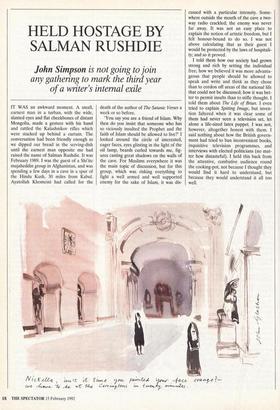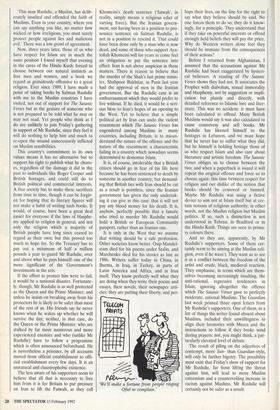HELD HOSTAGE BY SALMAN RUSHDIE
John Simpson is not going to join
any gathering to mark the third year of a writer's internal exile
IT WAS an awkward moment. A small, earnest man in a turban, with the wide, slanted eyes and flat cheekbones of distant Mongolia, made a gesture with his hand and rattled the Kalashnikov rifles which were stacked up behind a curtain. The conversation had been friendly enough as we dipped our bread in the serving-dish until the earnest man opposite me had raised the name of Salman Rushdie. It was February 1989. I was the guest of a Shi'ite mujaheddin group in Afghanistan, and was spending a few days in a cave in a spur of the Hindu Kush, 30 miles from Kabul. Ayatollah Khomeini had called for the
death of the author of The Satanic Verses a week or so before.
`You say you are a friend of Islam. Why then do you insist that someone who has so viciously insulted the Prophet and the faith of Islam should be allowed to live?' I looked around the circle of interested, eager faces, eyes glinting in the light of the oil lamp, beards curled towards me, fig- ures casting great shadows on the walls of the cave. For Muslims everywhere it was the main topic of discussion, but for this group, which was risking everything to fight a well armed and well supported enemy for the sake of Islam, it was dis-
cussed with a particular intensity. Some- where outside the mouth of the cave a two- way radio crackled; the enemy was never far away. It was not an easy place to explain the notion of artistic freedom, but I felt honour-bound to do so. I was not above calculating that as their guest I would be protected by the laws of hospitali- ty; and so it proved.
I told them how our society had grown strong and rich by setting the individual free; how we believed it was more advanta- geous that people should be allowed to speak and write and think as they chose than to cordon off areas of the national life that could not be discussed; how it was bet- ter to permit insults than to stifle thought. I told them about The Life of Brian. I even tried to explain Spitting Image, but inven- tion faltered when it was clear some of them had never seen a television set, let alone a life-sized latex puppet. I was not, however, altogether honest with them. I said nothing about how the British govern- ment had tried to ban inconvenient books, inquisitive television programmes, and interviews with elected politicians (no mat- ter how distasteful). I held this back from the attentive, combative audience round the cooking-pot, not because I thought they would find it hard to understand, but because they would understand it all too well.
'This man Rushdie, a Muslim, has delib- erately insulted and offended the faith of Muslims. Even in your country, where you can say anything you like, no matter how wicked or how irreligious, you must surely protect people against lies and malicious evil.' There was a low growl of agreement.
Now, three years later, those of us who have respect for Islam are in much the same position I found myself that evening in the caves of the Hindu Kush: forced to choose between our natural instincts as free men and women, and a book we regard as gratuitously offensive to a great religion. Ever since 1989, I have made a point of taking books by Salman Rushdie with me to the Muslim countries I have visited, not out of support for The Satanic Verses but as the gesture of someone who is not prepared to be told what he may or may not read. Yet people who think as I do are unlikely to join Friday's gathering in support of Mr Rushdie, since they feel it will do nothing to help him and much to re-open the wound unnecessarily inflicted on Muslim sensibilities.
This country's commitment to its own values means it has no alternative but to support his right to publish what he choos- es, regardless of the damage it did in the past to individuals like Roger Cooper and British hostages, and could still do to British political and commercial interests. A free society has to make these sacrifices from time to time, though it can be forgiv- en for hoping that its literary figures will not make a habit of writing such books. It would, of course, have been a great deal easier for everyone if the laws of blasphe- my applied to religion in general, and not only the religion which a majority of British people have long since ceased to regard as their own; but this proved too much to hope for. So the Treasury has to pay out a minimum of half a million pounds a year to guard Mr Rushdie, over and above what he pays himself: one of the more significant of the Government's investments in the arts.
If the effort to protect him Were to fail, it would be a national disaster. Fortunate- ly, though, Mr Rushdie is as well protected as the Queen and the Prime Minister; and unless he insists on breaking away from his protectors he is likely to be safer than most of the rest of us. His friends say he never knows when he wakes up whether he will survive the day; neither, in that case, do the Queen or the Prime Minister, who are stalked by far more numerous and more experienced enemies and who (unlike Mr Rushdie) have to follow a programme which is often announced beforehand. He is nevertheless a prisoner, by all accounts moved from official establishment to offi- cial establishment every few days. It is an unnatural and claustrophobic existence.
The less aware of his supporters seem to believe that all that is necessary to free him from it is for Britain to put pressure on Iran to lift the Fatwah, as they call Khomeini's death sentence (`fatwah', in reality, simply means a religious edict of varying force). But the Iranian govern- ment, not having been in a position to pro- nounce sentence on Salman Rushdie, is not in a position to rescind it. That could have been done only by a man who is now dead, and some of those who support Aya- tollah Khomeini will for years to come feel an obligation to put the sentence into effect. Iran is not above suspicion in these matters. There is reason to believe that the murder of the Shah's last prime minis- ter, Shahpoor Bakhtiar, in Paris last year had the approval of men in the Iranian government. But the Rushdie case is an embarrassment which they would prefer to live without. If he died, it would be a seri- ous blow to Iran's hopes of an opening to the West. Yet to believe that a simple political act by Iran can undo the violent resentment which The Satanic Verses has engendered among Muslims in many countries, including Britain, is to misun- derstand the nature of the offence and the nature of the resentment: a characteristic failing in a country which nowadays seems determined to demonise Islam.
It is, of course, intolerable that a British citizen should go in fear of his life here because he has been sentenced to death by someone in another country; but demand- ing that British ties with Iran should be cut as a result is pointless, since the Iranian government has given the only undertak- ing it can give in this case: that it will not pay any blood money for his death. It is, anyhow, perfectly possible that a fanatic who tried to murder Mr Rushdie would hold a British or European Community passport, rather than an Iranian one.
It is only in the West that we assume that writing should be a safe profession. Other societies know better. Osip Mandel- stam died for his poems under Stalin, and Marchenko died for his stories as late as 1986. Writers suffer today in China, in Burma, in Iraq, in Turkey, in parts of Latin America and Africa, and in Iran itself. They know perfectly well what they are doing when they write their poems and essays, their novels, their newspaper arti- cles: they are putting their liberty, and per- 'We'll make a fortune from people ringing Oftel to complain.' haps their lives, on the line for the right to say what they believe should be said. No one forces them to do so; they do it know- ingly, for a principle. They understand that if they take on powerful interests or offend strongly held beliefs they will pay the price. Why do Western writers alone feel they should be immune from the consequences of their actions?
Before I returned from Afghanistan, I assumed that the accusations against Mr Rushdie had been exaggerated by hysteri- cal believers. A reading of The Satanic Verses shows they had not. It associates the Prophet with diabolism, sexual immorality and blasphemy, not by suggestion or impli- cation but plainly and directly, with detailed reference to Islamic lore and liter- ature. This was no accident: it must have been calculated to offend. Many British Muslims would say it was also calculated to cause controvesy and sell books. Mr Rushdie has likened himself to the hostages in Lebanon, and we must hope that he never has to suffer what they did; but he himself is holding hostage those of us who respect Islam and also care about literature and artistic freedom. The Satanic Verses obliges us to choose between the two; and when a paperback is issued it will repeat the original offence and force us to choose again: this time between respect for religion and our dislike of the notion that books should be censored or banned. Maybe Mr Rushdie was using a fictive device to aim not at Islam itself but at cer- tain notions of religious authority; in other words, not the Muslim religion but Muslim politics. If so, such a distinction is not understood in Tehran, in Bradford or in the Hindu Kush. Things are seen in prima- ry colours there.
And so they are, apparently, by Mr Rushdie's supporters. Some of them cer- tainly seem to be aiming at the Muslim reli- gion, even if he wasn't. They want us to see it as a conflict between the freedom of the artist and crude, black, medieval reaction. They emphasise, in terms which are them- selves becoming increasingly insulting, the anti-rational, regressive tendencies in Islam, ignoring altogether the offence which The Satanic Verses gave to perfectly moderate, rational Muslims. The Guardian last week printed three open letters from Mr Rushdie's supporters. One of them, in a list of things the writer found absurd about Muslims, included their unwillingness to align their lavatories with Mecca and the instructions to follow if they broke wind during prayers: not, you might think, a par- ticularly elevated level of debate.
The result of piling on the adjectives of contempt, more Sun- than Guardian-style, will only be further bigotry. The possibility must exist that Friday's show of support for Mr Rushdie, far from lifting the threat against him, will lead to more Muslim extremism and a countervailing increase in racism against Muslims. Mr Rushdie will certainly not be safer as a result.



























































 Previous page
Previous page